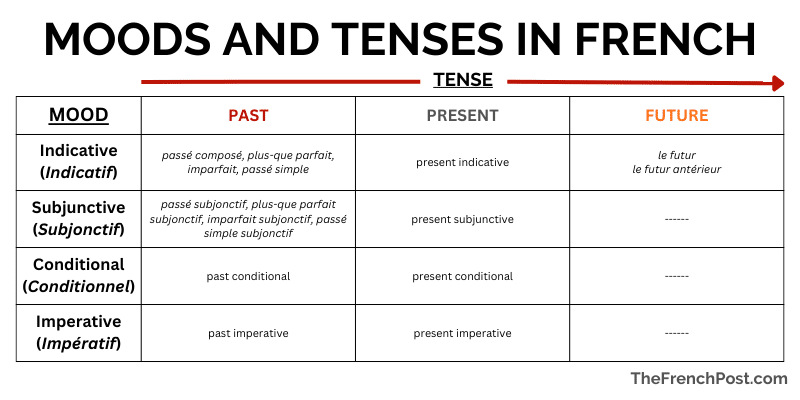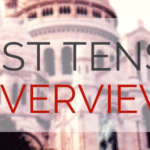
After you’ve mastered the present subjunctive, it’s time to learn the French past subjunctive. Similar to its present tense version, the past subjunctive broadly implies uncertainty, doubt, or conditionality applying to a past action.
Comparison of the French Past Subjunctive and the Passé Composé
To understand where the past subjunctive fits into an overall understanding of how verb tenses and moods work in French, check out this chart of (the major) French tenses and moods. Note where passé du subjonctif is listed in the “past” column and the “subjunctive” mood.
You can also see from this chart that passé du subjonctif runs “parallel” to the indicative mood’s passé composé. They both refer to distinct events that took place in the past but imply different levels of uncertainty.

All the other tenses in the past subjunctive cell are fairly rare and will not be discussed in this lesson, but the passé du subjonctif is common in both written and spoken French.
How to Form the French Past Subjunctive
Fortunately, the passé du subjonctif doesn’t require learning any new concepts, as long as you’ve mastered the passé composé. In both cases you use avoir or être as the past tense auxiliary verb + [past participle].
The same rules as passé composé also apply for determining whether to use avoir or être as the auxiliary verb.
Step 1: Conjugate Être or Avoir
The past subjunctive starts with using the present subjunctive forms for avoir or être based on whatever the subject or subject pronoun of the sentence is.
| avoir (present subjunctive) | |
| j’aie | nous ayons |
| tu aies | vous ayez |
| il ait | ils aient |
| être (present subjunctive) | |
| je sois | nous soyons |
| tu sois | vous soyez |
| il soit | ils soient |
Step 2: Add the Past Participle
Again, just like with passé composé, you then add on the past participle of the verb (choisi for choisir, vendu for vendre, etc.). Then your past subjunctive conjugation is complete!
Example Sentences with the French Past Subjunctive
Here are a few example sentences that use the past subjunctive. Note that the subjunctive “trigger” phrases involve que and are the same list found in our present subjunctive lesson. Broadly speaking, they’re phrases that imply duty, emotions, doubt, or uncertainty. For example:
Avoir Conjugations
Bien que nous aimions le patin à glace, nous aimons encore plus le ski. (“Although we love ice skating, we love skiing even more.”)
Je suis si heureux que tu aies décidé de nous rejoindre pour ce voyage. (“I’m so glad you decided to join us on this trip.”)
Être Conjugations
Note that the être verbs will need gender/number agreement, just like they do in passé composé. For example:
Nous doutons qu’elle soit venue ici seule. (“We doubt she came here alone.”)
Je suis surpris que vous soyez restés jusqu’à minuit. (“I’m surprised you all stayed until midnight.”)
Next Steps
Once you’ve got the past subjunctive down (as well as the present subjunctive), your subjunctive skills are mostly complete. As we mentioned earlier, there are imparfait and plus-que-parfait forms of the subjunctive, as well, but they are rare. We would suggest you move on to learning other grammar topics, like the suggestions on our Advanced French page, in order to improve your French skills.




